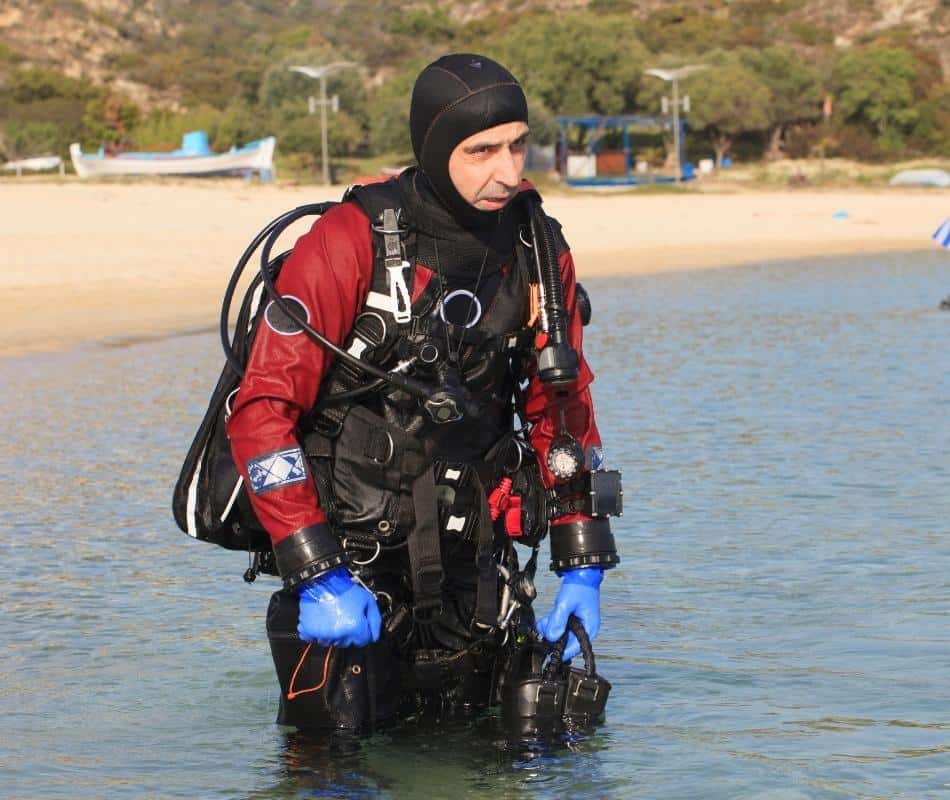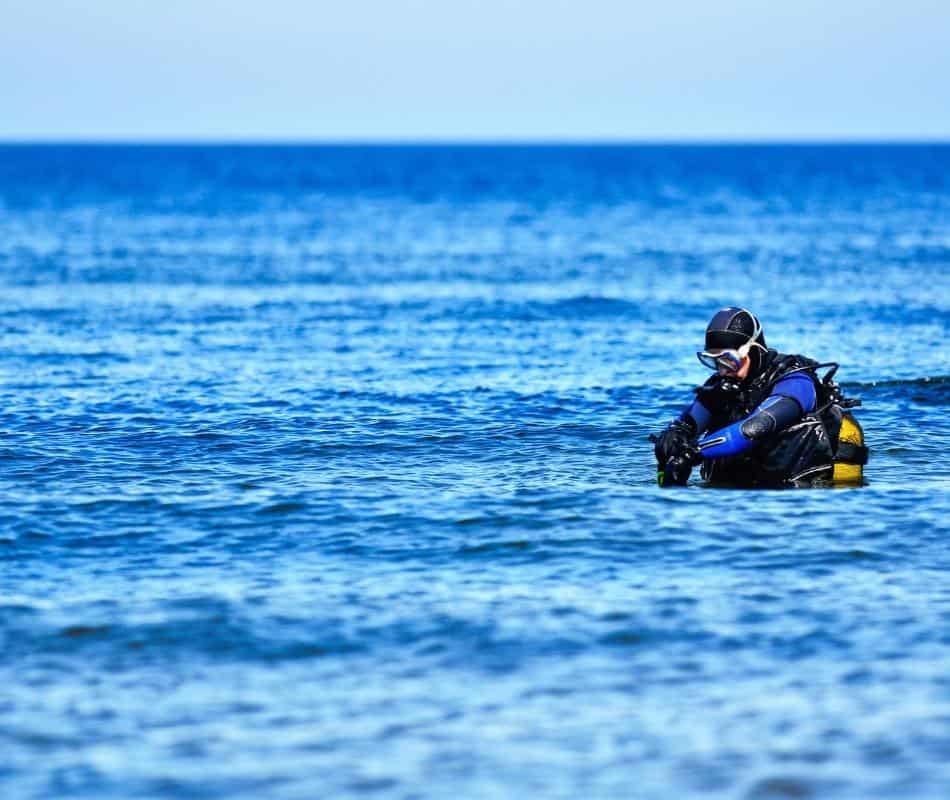A lot of divers normally get certified in the tropical areas of the world, often this happens in a resort setting where all the equipment is ready for you, the sun is shining and you’re getting ready to dive into some tropical water to view a beautiful reef and all the wildlife on it. What about the other 60% of the oceans and lakes that aren’t warm? Maybe you have heard of Ice diving. Ice diving involves diving under the ice in an overhead environment when it’s typically well below zero. Ice diving is very different from cold water diving. Coldwater scuba diving takes place most times of the year as there is more cold water than tropical, and it doesn’t require specific training from a dive instructor. Hopefully, this article will inspire you to do so if you want to know how to dive in cold water safely and comfortably.

Safety
Whenever you’re cold water diving, there are always safety factors to consider. Some of which are obvious and covered by your Open water training.
As the PADI open water course teaches that cold water diving adds mental stress and can be more strenuous on the body due to the extreme temperature swings, PADI instructs that one should add 10 feet to the planned dive depth. Adding 10ft to the dive plan allows for delayed off-gassing due to vasoconstriction (blood moving to your core) due to getting cold during a dive.
There are also some factors that I have learnt as I have dove throughout the years. In southern Ontario, where summers can have 40℃ surface temperatures 3℃ water, along with -10℃ surface temps and 1℃ water temperature with no ice conditions in the winter. I have become aware of some factors which can help alleviate stress before and during a dive.
The locations are among the other factors that I strongly consider while gearing up and down for a dive. For example, am I doing a shore dive with a long walk to the water and a dive on a boat charter with no heat source? These are the kinds of things that will make or break a cold water dive in terms of safety.
Diving when it is warm out in cold water
There are many great diving locations where the water will be considered cold. Yet, it is warm on the surface, places like British Columbia, Canada, Newfoundland, Canada in the summer (freezing there in the winter), North Carolina, California, and tone of other places. So, when diving in cold water in warm weather, you have to juggle two counter ideas—staying cool while gearing up and staying warm when diving in the cold water.
If you’re diving a wetsuit from a 5mm full suit or a two-piece 7mm farmer john wetsuit with another 7mm shortie, it will get sweltering, potentially heat exhaustion. I have been on several dives where a diver will get suited up and wait in the heat in their wetsuits, only leading them to cancel their dive because they weren’t feeling well from the heat. Avoid sweating at all costs before the dive. Sweating and heat exhaustion can become real, even if it isn’t too hot, just because of the amount of equipment. Here are some tips to avoid overheating before your cold water dive.

- Pack your gear so that the equipment that is dawned first is packed last; fins and mask are the last things you grab before you take your giant stride in the water or when you’re walking to your entry site in shore diving. Those should be at the bottom of your dive bag. Your wetsuit or drysuit undergarment is the first thing going on, so they should be at the top of your gear bag.
- Be aware of what your buddy is doing. There is no sense in gearing up quickly only to wait 45 minutes while your buddy talks to the boat captain or takes their merry old time getting ready. On the other hand, if your buddy is slower, wait till they are partially geared up before you start preventing you from overheating.
- Take a cool-off break when gearing up if need be. Our dive group will often do this when gearing up, and we will break off into our dive buddy pairs and wander off into the water when we have just dawned our wetsuits or drysuits. We enter the water or jump in if there is something fun to jump off. feeling the cold water fill the wetsuit, wetting your head and hair will help acclimate to the cold to come and will aid in continuing dawning your equipment because you are now wet, and it will evaporate off of you, keeping you cooler than if you were just gearing up in your neoprene wetsuit or drysuit in 24℃ degrees Celsius weather for example
- I know this may sound obvious, but I have been on too many dives where people get sick and cancel dives because they are dehydrated. Breathing compressed air underwater is dehydrating. When it is hot, diving in cold water will make you sweat. Having plenty of water is sound planning.
Diving when it is cold out in cold water
Diving when it is below zero outside on the surface and in cold water isn’t for the faint of heart, and I think it shows who is committed to being a cold water diver and an absolute adventure junkie. However, there are many locations where diving in the winter is when you get the best visibility or is the only season one can access a particular site. Regardless of your reason for diving, it can be done comfortably and safely when it is cold out in cold water.

Here are some tips:
Like before, pack your great in an organized way, enabling you to gear up quickly and efficiently. I find this helpful because you will be warmer in the cold weather once your wet or dry suit is on, but until you do that, you have to strip down and expose yourself to the elements. Having a car or a boat to gear up is helpful. If that isn’t an option, then having your gear organized will save you discomfort on your hand as they will typically get cold first gearing up because you won’t be able to wear gloves donning the wetsuit and some of your other equipment. After all, you may need your dexterity.
If you’re diving in a wetsuit, it may help extend your dive or make your entry into the water more comfortable if you bring a bottle of Lukewarm water to fill your wetsuit before you enter the cold water. This will help you be more comfortable before entering the water and make a real difference, as you won’t get that initial rush of cold water filling your wetsuit. The transition will be much more gradual, if at all. Don’t do this too long before entering the water, as your wetsuit won’t hold the water in it on the surface very long and will defeat the purpose if it leaks out before entering the water.
- when diving in a drysuit, depending on how cold it is, come to the dive site with your undergarment and dive soaks already on. Then, you won’t have to strip down and give your body a chill before putting the undergarment on.
- Because so much dive equipment requires dexterity in our hands when gearing up. It is tough to grip neoprene with a gloved hand. Donning a wetsuit, or putting on a drysuit, adjusting the dry seals is almost impossible with gloves on. Keeping your hands warm before a dive will be vital as starting a cold water dive with cold hands will quickly develop into an unsafe situation. Because having a hand warmer in your dive bag or a pair of thin gloves where the fingers have been cut out may help you stay warm and comfortable while gearing up.
- if you’re a regular cold water diver and you’re particularly sensitive to cold water, there are the options of heated gloves and undergarments. I don’t have heated underwear yet, but as my fitness regime lowers my body fat, I feel a fundamental change in my tolerance to the cold water, making me consider this piece of kit more and more. As a result, more and more divers in my dive group are using this underwear and only have good things to say.
Conclusion
Being comfortable enough to dive in cold water will open up another realm to your diving. Coldwater dives typically have some of the most pristine shipwrecks and some of the most fantastic wildlife and geology that one will ever see. However, it can also become quite equipment-intensive, which if you the kind of person who likes toys, I would encourage everyone to expose themselves to some cold water dive to see if it’s for them.

